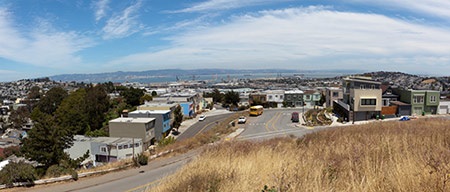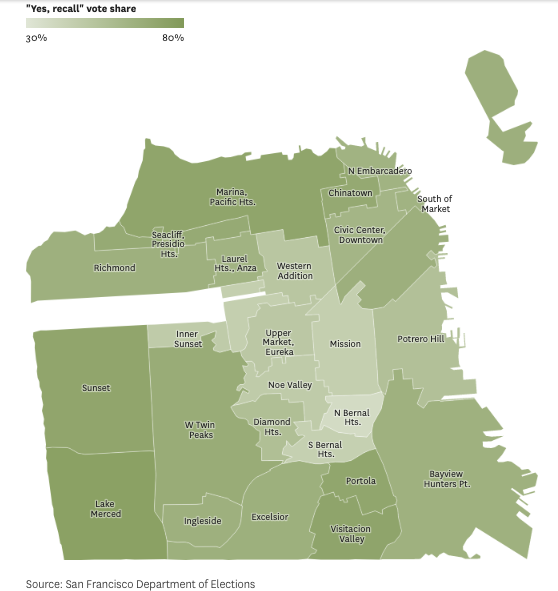
Last night provided me a unique vantage point on the Boudin recall effort: I was an inspector at a polling station in Bayview-Hunter’s Point, which is a neighborhood with a long history of neglect and criminalization. It is also unique in its demographics: 33.7% African American in a city that is just under 6% African American as a whole. There were approximately 650 registered voters in our precinct. 18 voted by mail and 17 voted in person, for a grand total of 35 voters. That’s 5% of the electorate. Things were somewhat better, but not by much, elsewhere in the city. By stark contrast to the 2020 Presidential election, pre-election mail-in voting in this local election–the third in 2022!–was very low. Our Federal Election Deputy (FED), who came to visit us throughout the day, reported that the polls were quiet and dormant throughout the whole day, pretty much everywhere.
Why does this matter? Take a look at a map published in today’s Chron of the neighborhoods that voted against Boudin:

At first glance, the story appears to be that neighborhoods associated with Asian-American populations tended to support the recall more fervently. This is unsurprising, and only talked about in hushed tones even though I think it is a big part of the story. In the last few weeks I saw concerted, fervent activism in support of the recall from very similar crowds to the ones who drove the SFUSD recall from a few months ago: it’s not all about out-of-town Republican millionaires conning unsuspecting masses into false consciousness. These are pretty much the same parents who resented the performative woketalk from the Board about school renaming and lottery admissions to Lowell. I suspect that some residual energy poured over from the previous recall (which I think was 100% justified) to this one (which I think was not.) The superficial narrative might be that a permissive and forgiving attitude toward prosecuting some people (read: presumably, young African American men) incentivizes crime and victimization (read: toward, presumably, Asian American victims) in the same way that lowering standards and talking about reparations and abolitionism (read: a narrative that supports, presumably, a monolithic African American interest) harms the pursuit of hard work and excellence in education (read: the purview, presumably, of Asian American students and parents.)
This story, which suggests the fomenting of racial animus between these two groups, building on the racial conflict undertones of the previous recall, is not completely preposterous. Most of the people who came to vote in person yesterday at our precinct were African American, and from their conversations, I gathered they all came motivated to vote against the recall. But this assumes that we can understand and generalize trends from a pretty minuscule percentage of San Franciscans. It’s not that the people who live in my beautiful city don’t care about criminal justice administration. NextDoor and other social media outlets are full of people chewing each other’s heads off about whether this or that wave of smash-and-grab, retail theft, or other incident is Chesa’s fault. But how many people care enough about this to put work into reading a hefty booklet and considering their positions on a three-page ballot, in which Prop H was the very last voting issue on the back side of the third page, for the third time in a row in the same year?
Over the years, I’ve returned again and again to Vanessa Barker’s excellent book The Politics of Imprisonment. Barker conducts a three-way comparison of penal politics in three states: California, Washington, and New York, finding that California’s political culture more easily lends itself to punitive experiments because of its polarization and populism. I write about this culture in Yesterday’s Monsters, when I show how politicized and emotion-driven the issue of parole is. In this kind of political environment, where money and strong interests can push something into the ballot as well as foment a well-oiled promotion machine (complete with all the tricks and deceptions we’ve come to expect from the initiative process), it is not difficult to swing the pendulum back and forth, from big reforms to big cancellations, from experiments in jurisdictional shifts to draconian policies masquerading as victim’s rights policies, and everything in between.
Ultimately, I think that what we saw here was just an exercise in manipulating this big machine and effectuating huge change through a relatively small number of voters. Direct democracy can be, and is, too direct when it imposes this burden thrice a year on already exhausted, grieving, anguished, and ticked off people with an empathy deficit from three years of awfulness that followed four years of a different kind of awfulness. In sum, whether or not the small minority who bothered to show up at the polls has false or true consciousness matters much less, sadly, than the forces exploiting the initiative process far beyond the Bay Area.
Would it have made a difference if the entire Bayview-Hunter’s Point electorate showed up en masse and voted against this recall? Of course it would. But after everything we’ve all been through–the impoverished folks in the neglected parts of town disproportionately suffering–we just didn’t have it in us to make yesterday a proud, sparkling moment for people-powered government, and even though it’s not our fault, we will all have to live with the consequences. Increased incarceration and the return of cash bail will not deter violent crime (but people’s attention will wander, and those who supported the recall will stop paying attention). Crime might go up (despite the recall, the supporters will say, or because of the recall, the opponents will say) or it might go down (because of the recall, supporters will say, or despite it, opponents will say) and we will continue to delude ourselves that dumbing down complicated policy decisions, deceiving people with oversimplified campaigns, and seasoning everything with some piquant interracial conflict, is how democracy should work.
The truth is that crime rates are like the weather. They rise and fall for a variety of reasons, only a few of which we can measure, and most of which have nothing to do with who is in charge. They have very little to do with big punishment trends (though, in localized situations, they do depend on effective police work in solving crime, which is a damn difficult thing to do when the community doesn’t trust the police enough to help.) It takes a real sea change in policy to effectuate changes in criminality patterns. But our megalomanic assumption that we can control crime rates through tinkering with policies will persist, and we will keep tinkering, until no one has any energy left to vote.
I offered a few more thoughts on KCRW here.




No comment yet, add your voice below!